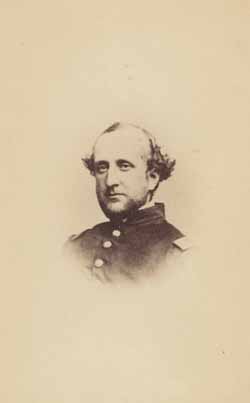The Death of a Soldier
 Captain Richard Cary of the Second Massachusetts Volunteer Infantry Regiment, the subject of the March 1862 feature in the MHS' online presentation Looking at the Civil War: Massachusetts Finds Her Voice, was shot in the leg on 9 August 1862 during the battle of Cedar Mountain in Virginia. Although Cary’s injuries were not immediately fatal, his company was unable to bring him to a field hospital as there were no ambulances available for transport. Cary died of his injuries on the battle field the following day.
Captain Richard Cary of the Second Massachusetts Volunteer Infantry Regiment, the subject of the March 1862 feature in the MHS' online presentation Looking at the Civil War: Massachusetts Finds Her Voice, was shot in the leg on 9 August 1862 during the battle of Cedar Mountain in Virginia. Although Cary’s injuries were not immediately fatal, his company was unable to bring him to a field hospital as there were no ambulances available for transport. Cary died of his injuries on the battle field the following day.
In a letter dated 11 August 1862 contained in the Cary Family Papers III held by the MHS, Eugene Shelton, Richard Cary’s brother-in-law and fellow officer, wrote to his parents informing them of the circumstances surrounding Richard’s death. Eugene relates that as Richard lay dying in an area occupied by Confederate soldiers, “a rebel got a piece of old wood & placed it under Richard’s head for a pillow & gave him a mug of water.” However, he added that after his death the “rebels robbed him of everything & turned his pockets inside out.” A fellow soldier who also lay dying in the field persuaded the rebels to return his locket of his wife Helen (Eugene's sister) as well as his seal ring and Eugene reports those items would be forwarded home "as soon as teh express will take them. Eugene notes that while it is generally believed that Richard died from a loss of blood, “his countenance is perfect and he looks very pleasant” and closes his letter "Tell Helen, Richard died without a murmur & without pain."**

Coming forward to the 21st century, after reading all of Captain Cary’s correspondence and doing research for the contextual essay corresponding with the March 1862 feature, I became thoroughly enthralled with his tragically short life. My fascination with Captain Cary led me to visit his grave at the Mount Auburn Cemetery in Cambridge, Massachusetts where I brought him a spray of roses to thank him for allowing me the opportunity to read his charming, insightful, and thought provoking letters.
** For more insight into letters sent home to the family members of slain soldiers see Drew Gilpin Faust's This Republic of Suffering: Death and the American Civil War (New York: Alfred A. Knopf, 2008).
Hive Home
Recent Posts
- This Week @MHS
- Founder to Founder
- "Great sights upon the water...": unexplained phenomena in early Boston
- This Week @MHS
- Images of the 1925 bombing of Damascus
- “Light, airy, and genteel”: Abigail Adams on French Women
- This Week @MHS
- George Hyland’s Diary, January 1919
- New and Improved: The Tufts Family Logbooks
- This Week @MHS
- Upcoming Education Events
- The First Publication of Phillis Wheatley
- Christmas 1918
- A lovely day for a cup of Tea!
- This Week @MHS
Beehive Series
- Around MHS
- Around the Neighborhood
- Blog Info
- Civil War
- Collection Profiles
- Collections News
- Education Programs
- Exhibitions News
- From Our Collections
- From the Reading Room
- From the Reference Librarian
- MHS in the News
- On Loan
- Readers Relate
- Reading the Proceedings
- Recent Events
- Research Published
- Today @MHS
Archives
For questions, comments, and suggestions,
email the beekeeper
![]() subscribe
subscribe


Comments
Commenting has closed for this post. Thank you for participating.